In this conversation, Amber Starks (also known as Melanin Mvskoke) and Kyle T. Mays discuss the siloing of Afro-Indigenous identity, the opportunities and challenges of developing Black and Indigenous solidarity, and the potential to build a future more deeply rooted in kinship. Kyle T. Mays is an Afro-Indigenous (Saginaw Chippewa) scholar of urban studies, Afro-Indigenous studies, and contemporary popular culture, as well as the author of An Afro-Indigenous History of the United States and two other books. Amber Starks is an Afro-Indigenous (African American and Native American) advocate, decolonial theorist, and budding abolitionist whose activism seeks to affirm and uplift the multidimensional identities of Black and Native peoples through advocacy regarding anti-Blackness, abolishing blood quantum, Black liberation, and Indigenous sovereignty. This conversation is a contribution to the Black and Indigenous Futures series, which reflects on Black and Indigenous shared leadership, solidarity, kinship, identity, and artistic practice.
On Black and Indigenous Shared Kinship Futures
Kyle T. Mays: What would you say is the contemporary reality of Black and Indigenous relations since the protests in 2020?
Amber Starks: People were genuinely outraged when they witnessed for themselves the reality of state-sanctioned and state-perpetrated violence against Black folks. But for a lot of us, it just confirmed what we know to be true and confirmed the ongoing experiences of our families and communities.
That’s also when I felt this space opened up for Black, Native, and Afro-Indigenous relatives to have some very real and vulnerable conversations about the reality of living right now as a Black, Native, or Afro-Indigenous person. There were a lot of opportunities for people to share their stories. People were genuinely willing to listen to what we were facing in our respective communities and were open to our strategies for change.
Then I think people got fatigued. Some folks may have become defensive when the truth became too real, too raw, and too much. It wasn't just about state violence; it was also about the harm that we've caused each other since contact and how that ongoing harm shows up even today. The capacity to have those conversations slowly constricted, and the available public spaces to have those conversations became limited. Many of the people speaking their truths started experiencing real backlash and sometimes violence, which made speaking up unsafe at time.
With that said, I think there is still a little more capacity than there was prior to 2020, and I appreciate the spaces that are still open.
Kyle: I feel the same way. It was like all the whole oyster opened up—boom!—right at a particular moment, in the aftermath of this particular lynching. I had friends all over the country who were doing random activism, and they were a part of intentional Black and Indigenous spaces. There was conversation, and then it became warped. I've been trying to figure out why that happened and what that means going forward. I get tired of the up-and-down nature of Black and Indigenous solidarity.
Amber: I wonder if it has to do with people not having their individual material needs met. How do people believe in change when they don't see it in their own lives?
Kyle: Right.
I think people often don't distinguish carefully between being Black and Indigenous as two different sort of racialized, politicized groups.
Amber: Yes. I think people may not have a fundamental understanding of what it's like to live two different identities. They may look at us then put us in one box or the other, right? There may not be capacity to understand what it's like to be both and also how the history has led us to even having to keep saying, "I'm Black and Native."
Kyle: Yeah.
I love being Black. I will absolutely root for Black people my whole life, and I also love being Native and will equally root for Native people.
Amber: I also think that people still compartmentalize Afro-descendant people and Native people's experiences on this continent without context of how settler colonialism and white supremacy was reliant on the destruction of both our peoples. You and I and a lot of the other Afro-Indigenous folks have been living that, both erasure and frustration.
Kyle: I'm treated like a Black person in a lot of my life. I'm cool with being Black. I don't deny being Black. I walk around like a Black person. I also walk around like a Native person, too, but—
Amber: Totally.
Kyle: I understand how the rest of the world sees skin color. Regardless of what people want to think, this is my reality.
It should not be a reality for any of us, but it is. "Why do you live in a city?" I'm like, "That wasn't my choice."
Amber: For real. Even the city is Native land. I just have to tell people that constantly, like, "You're on Native land no matter where you live on this continent."
Like you said, it's these rigid racialized categories that rely on phenotype. I, like you, understand that people look at me they primarily see a Black woman (which I absolutely am) and not a Black and Native woman. Except sometimes when I wear my hair big and it's long, people are like, "Oh, I can see that" and I've heard the, "Oh, you have those cheekbones."
Kyle: It's the cheekbones.
Amber: It's always the cheekbones.
As a young person, I struggled with both my Blackness and my Native-ness. I knew I belonged to both of my people, so I was just trying to figure out how do I be Black enough? How do I be Native enough? How do I be both of them? And all under white supremacy.
I know have a firm understanding of who I am. I love being Black. I will absolutely root for Black people my whole life, and I also love being Native and will equally root for Native people.
Kyle: There is always a Black or Indigenous community in these very elite spaces, but predominantly at a university. It's always in these spaces where they deal with the double bind of representation.
Amber: Yeah.
Think about Walter Plecker, Thomas Jefferson, and all those people who did their best to ensure that Blackness didn't “sneak” into the white gene pool, but who sought to ensured that a pathway existed for Native-ness to whiteness in an attempt to commit genocide against Native peoples and to steal Native land. There were and are always these guardrails to keep out Blackness, right? Even today.
This is how white supremacy functions. Under white supremacy, there are these very real boundaries that are meant to determine who people are allowed to be with. There are also real consequences when people decide to challenge or dissolve those borders to have relationships with people, whether those be platonic or political or romantic. We—Afro-Indigenous relatives—bear the burden of all that.
In my work I ask people why they're interested in maintaining those boundaries. A lot of times, people will say it’s about cultural protection or maintenance or as a means of tradition. People have said, for instance, “Before contact, there were no Black Native people,” in an attempt to justify disregarding Afro-Indgeneity and as a means of dismissing our realities as both Black and Native.
Kyle: What? I haven't heard of this one. That's crazy.
Amber: You would be so amazed by some of the things that I've heard. I've heard, "I'm not Native because I have a Black nose," or "I'm not Native because I didn't grow up on a reservation. I should just be happy being Black."
How do we build different sorts of relationships? How do we relate better? What does kinship mean for us?
Kyle: What are people doing?
Amber: Right?
Let's imagine that colonialism didn't happen. The world would have gotten smaller at some point, and people would have met and gotten together. When people get together, people do what people do. People start families. They start communities. They share ideas, food, culture, language. All of that stuff mixes.
This idea of racial purity is rooted in these white supremacist, capitalist, settler colonial ideas of where people belong and what their function within those systems, right?
If people are talking about decolonizing, we can't maintain these racial boundaries that require people to stay put in order then to reinforce people's roles within these systems.
Kyle: Absolutely. I want to explore two questions: why should Black and Indigenous people be in solidarity? Then, what is the meaning of Black and Indigenous kinship, which could be very different depending on nation or community?
I always think we should relate better. If you're, say—I hate putting it in these terms but just for analytical purposes—if you're only Black, only Indigenous, or Afro-Indigenous, how do we build different sorts of relationships? How do we relate better? What does kinship mean for us?
Many of us had clan systems. Clan systems developed and changed over time. There are different clans for outsiders who were outside of one's particular tribal nation, depending on the time period. What would it mean for tribal nations or different iterations of Indigenous communities and nations to create kinship or new clan systems—new systems of belonging—for Black people?
Amber: We have a mutual oppressor. That could just be a simple starting point for dismantling the system. Decolonizing means that we dismantle the hierarchies and we dismantle the othering of other groups of people.
I also root this idea in the Land. We talk about how the Land is our relative, and the responsibility we have to it. I think about how my Native ancestors were forced off the land so that my Black ancestors could work the Land, but that the Land was the constant witness to both of those very tragic events. Even as my Native ancestors were being forced to walk away, the Land held them up, just the way that the Land held up my Black ancestors as they toiled and their blood was shed. Both of our ancestors' blood was shed on the Land. The Land understands the displacement, the violence, the loss that both of our peoples have experienced. It has been a witness for both of our peoples. Therefore, we should make the Land our starting point, our point of collective understanding. Like you said, we should then develop new ways of thinking about belonging and who is a guest and who is actually a settler.
Therefore, it’s pertinent that Black and Native folks understand that we have a mutual oppressor. We have both been displaced and removed under this settler colonial plantation project. And Black folks are not settlers. Thus, it is our responsibility not to replicate settler colonial and racial capitalist values or weaponize them against one another. And in order to build authentic kinship, there must be an understanding that respect is due to the Land and that we have a responsibility to one another as we practice living in this decolonized world we both say we want.
I think it's going to take Black and Native folks doing what I've been asking people to do, which is stop trying to meet at the table. Let's meet on the Land. Let's practice what we want, because empires fall. They fall all the time, and if we don't practice it now, we're just going to replicate the systems that we say that we want nothing to do with. You know?
Kyle: Yeah. Black folks have always tried to find a way to belong in cultural realms. Like have y'all listened to Black music? Poetry?
It's a constant. Since those first folks were kidnapped and brought here, they've been trying to get home. When you no longer recognize home, you develop certain kinships with the Land that you're on.
Amber: Yes.
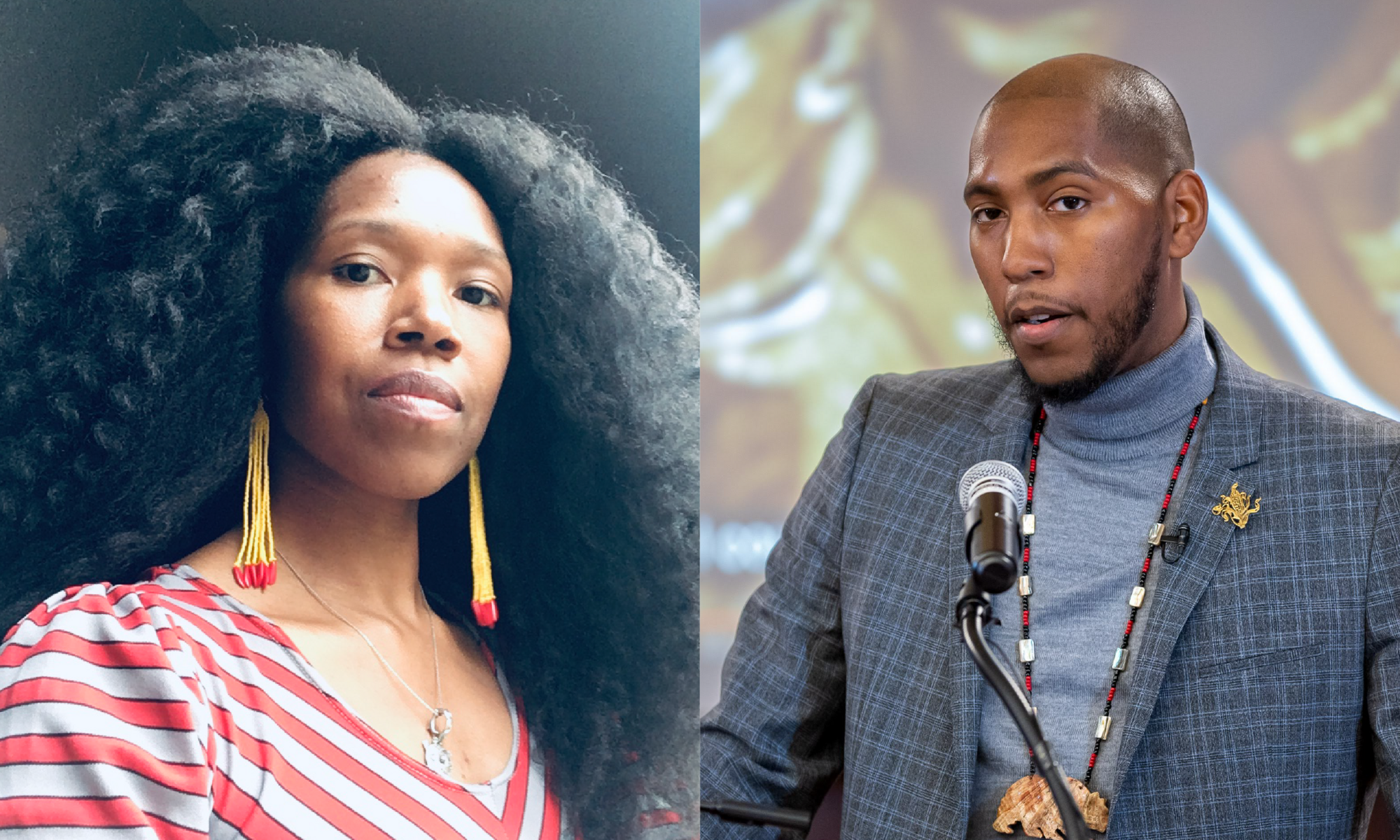
Photo of Amber Starks by Amber Starks. Photo of Kyle T. Mays by Owen Egan and Joni Dufour.
Kyle: That's why, to me, one of the most anti-colonial, decolonial things to do is going out and finding people. Find your folks. Find some Black folks that are near you. Be like, "Hey. Let’s go build this way.” Like Black folks can be like, "Hey, we've been here for a long time, but we want to, in good faith, make connections with you all."
There are so many cool ways that we can build kinship and solidarity, but white supremacy loves to hover over and divide folks. People actively fall into it, which is disappointing to me.
Amber: Yes. There are tangible consequences when people practice solidarity. We have seen that when people do try, the settler colonial, white supremacist structures do anything to sabotage the effort. Oppressors are not above using violence to uphold their systems or enticing people to stay in their boxes.
I agree with you. Imagine if Native nations were like, "These are the Black folks that have been in this community for generations. So, let's try to have talks about how we go forward.” Can you imagine that?
Kyle: Right?
Amber: That would be actual decolonizing.
We do see spaces where Black farmers recognize the territories they're on. They're trying to work with those Native nations to make sure that they're in right relationship. That gives me hope. It's possible. It's hard work.
But when we say we want to decolonize, we must understand that hard work is part of the process. Colonization has been messy, so why wouldn’t undoing it be messy too, right?
Kyle: Even the solution will be messy. What is one thing you would imagine would put us on the path towards our Black and Indigenous shared kinship futures?
Amber: Do you have one thing already? You go first.
Kyle: Okay. Something I've been thinking about… So you said meeting on the Land, which is brilliantly articulated and imagined.
Meeting on the Land, but doing something like it's a combination of powwow, stomp grounds, and Black family reunion.
Amber: Oh, that'd be amazing.
Kyle: Some version of all three of those things. We know all those things. They have food.
Amber: Yes.
Kyle: Ceremony.
Amber: Dancing.
Kyle: Music.
It's open. It's multi-generational, so you have everyone there. But there's a clear respect for our elders and the children. Young people are involved… Some version of that where we have food, conversation, and we sit and go to different sites to introduce ourselves.
Amber: There's a barbecue pit at each one.
Kyle: Right. Everyone is just like, "Hey. These are my relatives or the group I’m with.”
Do this every few months. We could do this regionally on someone's land or take back a city, whatever it is, and have all these conversations.
They don't have to be about, "This is how we're going to start the revolution." No. It's like, “Tell me about where you are from.” The space and infrastructure already exists.
I believe so many of us do want to find a way to practice Black liberation and Indigenous sovereignty. Even the hard parts.
Amber: I'm so glad you said that. I was thinking we need space to get to know each other and share our stories. I had been thinking about starting something here where I live. Just invite Black and Native folks to have lunch together. I love the idea of a barbecue powwow where folks just get to kick it and get to know one another.
When we don’t know each other for real, what we know about each other oftentimes comes from what colonizers tell us. That’s so limiting, and it doesn’t allow people to root for each other. We also think we know what the other person wants, or we think that we are each opposed to one another’s existence. But the non-Black Native folks I hang with are not interested in the destruction of Black folks, and the non-Native Black folks I know are not interested in the destruction of Native peoples.
I believe so many of us do want to find a way to practice Black liberation and Indigenous sovereignty. Even the hard parts. I think there’s an understanding that when people get together and try and work together, things happen—including conflicts. So how do we address conflict?
Kyle: Right.
Amber: Often, when we get mad at each other, we start naming the stuff that colonizers say about one another. We weaponize stereotypes against one another.
We have to uproot that, but I feel like the only way is to have real conversations with each other and get to know each other. We have to ask ourselves, “How do we invest in each other's community to the point that we want to root for each other?”
Kyle: Yeah. You're at a powwow or a stomp or whatever, and it's cool. It's beautiful.
Amber: Yeah. I had a moment at ceremony where we were having a break. Someone came up to me, and they were like, "Are you hungry?" and they took me over to their campsite and gave me food. That was a moment of care and intention. I thought that that was so sweet of that person.
I think that the idea of making sure each other is good is important for us to have some kind of future together. We build authentic community and relationship with one another so that we deeply care about each other. You know?
Kyle: I think it'll be good. I think it'll be good.
Amber: I think so too.

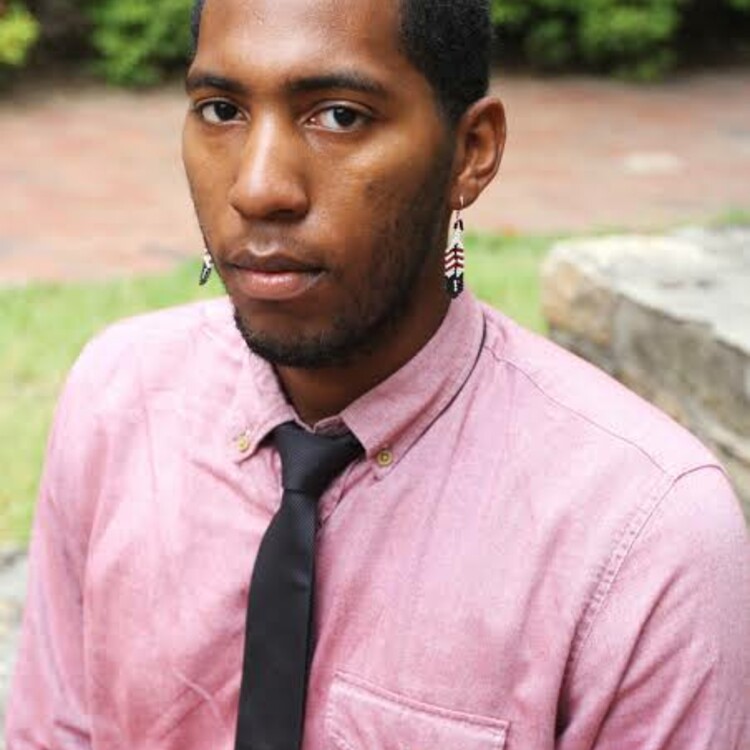
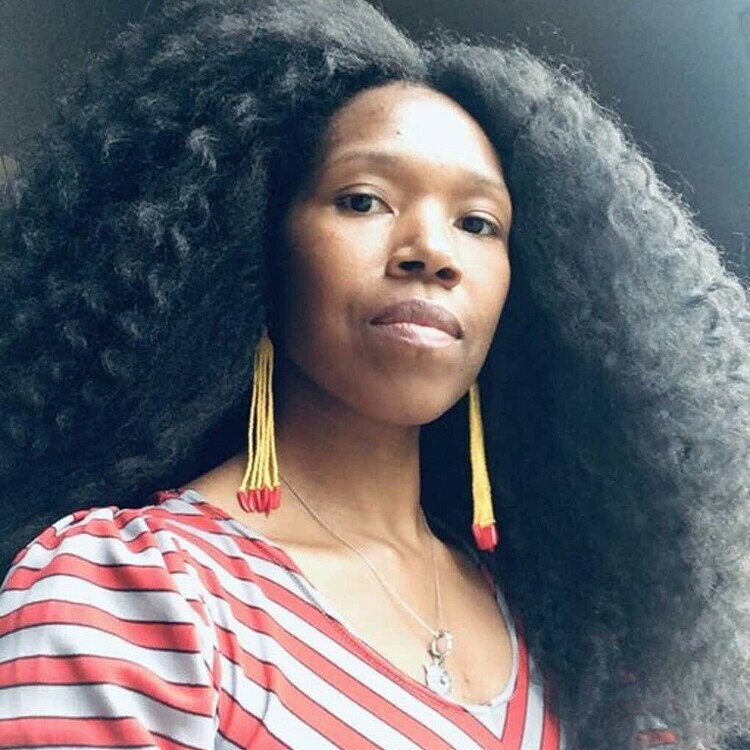
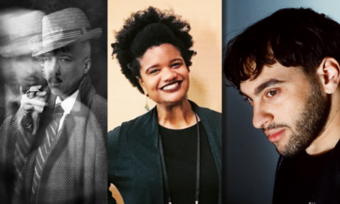



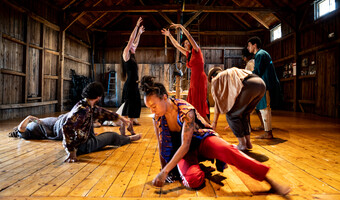

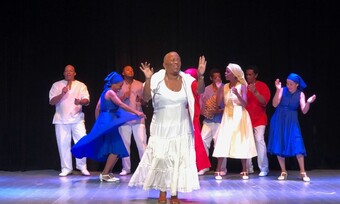



Comments
The article is just the start of the conversation—we want to know what you think about this subject, too! HowlRound is a space for knowledge-sharing, and we welcome spirited, thoughtful, and on-topic dialogue. Find our full comments policy here